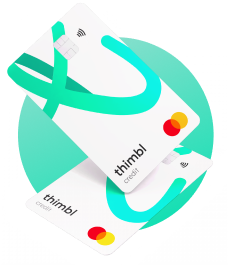Check your credit score for free
How to Check your Credit Report and Score for Free


 Find out how to check your credit report for free
Find out how to check your credit report for free Explore tips on how to improve your credit score
Explore tips on how to improve your credit score From poor to excellent, any credit score welcome to check their eligibility for a thimbl credit card
From poor to excellent, any credit score welcome to check their eligibility for a thimbl credit card Complete our short application form and get a decision in just 10 seconds
Complete our short application form and get a decision in just 10 seconds48.9% APR Representative (variable)
 Find out how to check your credit report for free
Find out how to check your credit report for free Explore tips on how to improve your credit score
Explore tips on how to improve your credit score From poor to excellent, any credit score welcome to check their eligibility for a thimbl credit card
From poor to excellent, any credit score welcome to check their eligibility for a thimbl credit card Complete our short application form and get a decision in just 10 seconds
Complete our short application form and get a decision in just 10 seconds

thimbl is a trading style of Digitonomy Limited which is a credit broker not a lender. Any credit that is obtained as a result of an application will be provided by Lendable Limited. Subject to eligibility. You may be offered a credit card with different terms if you do not qualify.


 For all credit scores
For all credit scores
 Check eligibility with no credit score impact
Check eligibility with no credit score impact


Whether it’s a loan, credit card, or mortgage, whenever you apply for credit, a responsible lender will take an in-depth look at your credit report as part of the application process. This insight into your financial history allows the lender to make an informed decision whether to lend to you.
Our guide explains how your credit report influences your credit score and includes information on where you can check your credit report for free; what to do if you spot any incorrect information; and how often you should check it.
You can check your credit score, and view a basic version of your credit report for free, with any of the three main credit reference agencies (CRAs) in the UK:
Experian
Experian allows users to access a basic view of their credit history for free. Additional, more in-depth features are available with a CreditExpert account, which costs £14.99 a month.
Equifax
Equifax offers a free, 30-day trial period. Once the trial period ends, membership costs £14.95 per month.
TransUnion
TransUnion is free to use.
- For all credit levels, from poor to excellent
- Checking won’t affect your credit rating
- 48.9% APR Representative (variable)

What sort of information can I expect to see on my free credit report?
You should be able to view the following information on your free credit report:
- Your personal information, including your name and address.
- Your electoral roll details.
- Any current and/or previous credit commitments.
- Your payment history, including any late or missed repayments.
- Any record of bankruptcies, county court judgments (CCJs), or insolvencies.
- Any financial associations; for example, a joint account(s) or mortgage(s); and
- Any recent credit searches.
If you have recently checked your eligibility for a credit product, you may notice one or more soft searches on your report. Please note that a soft search will not affect your credit score and is only visible on your credit file to you and the company who carried out the check.
A hard search, on the other hand, will affect your credit score and will be visible to any lender who accesses your report as part of a creditworthiness assessment. A hard search will remain on your report for around 12 months.
How often should I check my credit report?
It’s important to check your credit report for errors. Incorrect or outdated information on your credit report could have a negative impact on your credit score.
Experian state that you should aim to check your credit report at least once a year, but how regularly you log in is entirely up to you. You might make a habit of giving your report a once-over every couple of months or you may prefer to check-in more regularly if you’ve recently undergone a credit check or changed some personal information, such as your address.
What should I do if I spot incorrect information on my credit report?
If you notice any inaccurate information on your credit report, you can report it to the relevant CRA.
Here’s how to do it.
Experian
Experian customers can flag any incorrect information via an online dispute form.
In addition to this, you can also apply for a Notice of Correction, which could enable you to add a brief explanation to a certain entry on your credit report, such as a record of a missed repayment. For example, you might be able to apply to add something like, ‘Repayment missed due to loss of job’.
Equifax
You can report any inaccuracies to Equifax by clicking on the ‘Errors on my Credit Report’ section on your profile. Equifax will then raise the dispute with the company who supplied the information and give them 21 days to respond.
Alternatively, if you’d like to report the dispute in writing, you can do so by sending your enquiry to:
Equifax Limited
PO Box 10036
Leicester
LE3 4FS
A Notice of Correction can be raised through your Equifax Online Help account.
TransUnion
If you’ve noticed incorrect information on your TransUnion report, you can select the incident in question and click the ‘raise a dispute’ button. You can also raise a report through TransUnion’s online form here or in writing:
TransUnion Consumer Services Team
PO BOX 647
Unit 4
Hull
HU9 9QZ
TransUnion customers can ask that a Notice of Correction is added to their credit report by filling in an online form.
When you raise a dispute, the CRA will contact the company on your behalf. The company can choose to either investigate and amend; request further information; or dismiss the request if the information is correct.
How often is a credit report updated?
Your credit report will typically be updated on a monthly basis.
If you’ve reported incorrect information on your free credit report check, you may need to wait at least 45 days before you see an update. This timeframe can vary between the CRAs, and there’s no guarantee that the information will be removed or corrected.
How to improve your credit score
If you’ve done a free credit score check and are now wondering how to work towards a healthier credit position, we’ve included some pointers that could help get you started.
- Ensure the information on your credit report is correct and up-to-date.
- Register to vote.
- Pay all your bills and any current credit commitments on time.
- Where possible, try to keep your credit applications to a minimum to protect your score from multiple hard searches.
- If you have a credit card, avoid using it to withdraw money from a cash machine.
- If you’re hoping to increase your credit score, you should stay well within your credit limit and keep your credit utilisation as low as possible.
Good to know: your credit limit is the total amount of money you’re able to borrow on your credit card. Your credit utilisation is the percentage you’re currently using of your total credit limit. For example, if your credit limit was £100 and you had spent £50, your credit utilisation would be 50%.
Related post: How Long Does it Take To Improve Your Credit Score?
Why is it important to have a good credit score?
Lenders will view a good credit score as a reflection of positive financial habits, such as making repayments on time. A good credit score could increase your chances of being approved to borrow money should you need to apply in the future.
If you have a good credit score, you might also find that you’re offered more desirable interest rates, which will decrease the overall cost of borrowing.
If you’re concerned about money…
If you need a safe and empathetic ear to discuss any money or debt worries, please know that you can reach out to any of the following charities and organisations for free, confidential advice: StepChange, MoneyHelper, Citizens Advice, and National Debtline.

Page last reviewed: 30th April 2025
Page reviewed by: Alex Kosuth-Phillips
You get all this with thimbl
Tap and go
Quick and easy contactless payments up to £100.
Secure banking app
Manage your credit card online, wherever and whenever you like, with the free mobile app.
A trusted service
Over 4,500 positive reviews from our customers.
48.9% APR Representative (variable)
Quick links







Worried about money?
If you're worried about the cost of living, need support with budgeting, or think you might need debt advice, StepChange could help. They offer free and impartial support and help hundreds of thousands of people every year to deal with their debts and take control of their finances.
To find out how StepChange could help you, take the free Money Health Check. It's quick and easy to complete, and will give you a personalised recommendation on what to do next.
Meet the team
Head of Compliance
Head of Partnerships
Managing Director, thimbl.
Marketing Manager
Financial Content Writer
Frequently asked
questions
If you've got a question, you may just find the answer you're looking for here. If not, please visit our contact us page and get in touch.
What is thimbl?
Can I apply for a credit card with no credit score?
Can I apply for a credit card without a credit check?
What’s the difference between no credit history and bad credit history?
Bad credit history could be a result of several factors, including past poor financial management such as missed payments and bankruptcy, using a credit card to withdraw money from a cash machine, and even being the victim of fraud. Both a thin credit file and bad credit history could make applying for credit challenging.
A credit builder credit card could be a suitable option for people hoping to establish their credit score or move towards a healthier credit position.
Did you find this article helpful?
Let us know how we can be more helpful
Please leave your anonymous feedback to help us keep improving.
Need help or support?
Whether it's a question or you just need support, we're here to help.







